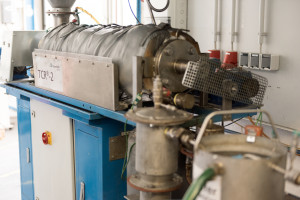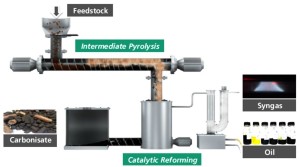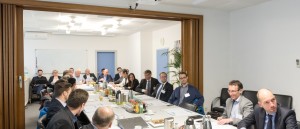Bioenergy will play a key role in the EU long term energy strategy for all applications and especially the transport sector, contributing up to 14% of the EU energy mix and up to 10% of energy demand in transport in 2020. It is foreseeable that this EU demand will be dominated by renewable fuels substituting gasoline, and middle distillates for the need of the road, aviation and marine transport sectors.
In December 2016 the European Commission has released its proposal for the RED II, the Renewable Energy Directive for the post 2020 period. This proposal introduces a gradual phase-out of conventional biofuels and sets a minimum target for advanced biofuels (produced from non food/feed sources) for transport. Imagine technologies integrated in a plant that could take waste biomass and convert it into liquids indistinguishable from fossil fuel diesel and fossil fuel petrol. Imagine if this conversion was achieved in hours instead of aeons.

TO-SYN-FUEL is a Horizon 2020 funded project and is designed to demonstrate a process that can achieve exactly this, thus meeting the European Commission’s call to action. The TO-SYN-FUEL consortium, composed of 12 SME, industrial, and scientific partners and coordinated by Fraunhofer UMSICHT, will together build up, operate and demonstrate the production of synthetic fuels and green hydrogen from waste biomass.
Building and extending from previous framework funding, the project is designed to set the benchmark for future sustainable development and growth within Europe and will provide a real example to the rest of the world of how sustainable energy, economic, social and environmental needs can successfully be addressed.
This process, which will use industrial organic wastes (pre-conditioned sewage sludge) as the feedstock, presents many advantages in terms of flexibility of scale and delocalisation at the regional and local level, the flexibility of feedstock, quality and reproducibility of products independent of feedstock, and competitively low costs (capital and running).
An integrated approach for delivering sustainable energies
The TO-SYN-FUEL process is built around thermo-catalytic reforming (TCR®) technology developed by Fraunhofer UMSICHT. TCR® produces renewable liquid fuels from waste biomass such as sewage sludge. The TCR® technology will be implemented in a new integrated process to convert a broad range of residual biomass into three main products: H2-rich synthesis gas, biochar and liquid bio-oil. By integrating high-pressure hydrodeoxygenation (HDO) and conventional refining processes, the bio-oil can be upgraded to green fuels that are ready to be used directly in internal combustion engines. These fuels comply with European standards for gasoline and diesel EN228 and EN590 and have already been demonstrated at pilot scale.

To demonstrate and validate the technical and commercial viability of this integrated approach, the project will combine in one plant TCR®, HDO and pressure swing adsorption (PSA) technologies. In addition, their respective environmental and social sustainability mapping will be included. The main objective is to create TCR® bio-oil, upgrade it into HDO bio-oil and to separate the produced H2, creating a new value chain. The HDO unit will be designed by the project partner VTS and will be the part of the plant where the bio-oil is upgraded. The bio-oil feedstock from the TCR® will be fed with hydrogen from the PSA unit into a fixed bed reactor system. There, reactions over the catalysts will occur, which will result in the removal of heteroatoms of the bio-oil such as sulphur, nitrogen and oxygen, increasing the quality of the oil. The process will run with a surplus of hydrogen. With respect to the economic efficiency and the environment, this excess will be recycled through the PSA unit, designed by the project partner Hygear.
In summary, the TCR process coupled with PSA and HDO enables the production of green transport fuels whilst generating an excess of hydrogen and energy. The integrated TCR/PSA/HDO approach has been designed to be economical at small scale due to the lower costs of the HDO step (compared to HDO of fast pyrolysis oils) and the low cost of capital investment of a TCR plant.
TO-SYN-FUEL will showcase a modular TCR/PSA/HDO plant, which will be able to operate sustainably, generate synthetic biofuels from local waste sources as well as produce combined heat and power from by-product energy carriers (residual syngas and biochar).
The implementation of this process and the related analysis will validate a comprehensive exploitation business plan, building on already established end-user interest, thus gaining an advantage to market with commercial exploitation of the technology as the next step of development.
Stakeholders engagement
In light of the strength of the project consortium, the project aims to develop and exploit technologies through commercialisation. Further to this, work is ongoing to attract other investors and to build confidence with respect to the products and the technology. Key investors and car manufacturers have expressed their interest in the project with several collaboration agreements with the organisations already in place.
The business plan will capitalise on the key strengths of project partners towards facilitating in the successful commercial deployment of the technology. The consortium has already taken preliminary steps to identify other customers and have entered into discussions with immediate customers for further exploitation of the technology upon successful demonstration.

In addition to those, one of the management actions is training across the consortium and the relevant stakeholders in the supply chain. The goal will be achieved by organising a dedicated focus group, which will adopt brainstorming techniques and other methods for eliciting views and knowledge from participants. Relevant stakeholders of the project will take place in the focus group and other relevant stakeholders can be invited into the process when needed.
Registered stakeholders will be targeted through dedicated communication, interviews, meetings, and cross-promotional activities in order to extend the projects reach and attract greater industrial interest and investment. Several open days will also be organised at the demonstration site of the plant to showcase the technology to stakeholders including fuel off-takers, feedstock providers, and local citizens as well as a promotional public engagement road tour and an associated set of YouTube videos, for example.
Single or grouped stakeholders from any sector of industry, research and innovation of the clean energy, particularly involved in the circular economy and low-carbon economy initiatives and interested in sharing and receiving further information on the TO-SYN-FUEL project activities and results, are invited to register themselves through the Stakeholder Registration Form.
Dissemination of project results
Dissemination of results in high impact journals is planned and articles will also be published for general and trade magazines in order to reach a wider audience of end users and beneficiaries. One final publication will be edited with the contribution of all partners. This will summarize the results of the project in a fact-based public-oriented document. The publication will thus feature chapters on the technology, the feedstock, the end uses, LCA and sustainability, risk management, techno-economic assessments and business cases.
Key dissemination tools are a website designed, updated and maintained throughout the whole duration of the project, a series of conferences targeted towards key stakeholders, publications in open access peer-reviewed journals as well as a public outreach tour using a vehicle run on biofuels produced by the demonstrator.
You can learn more about TO-SYN-FUEL project, upcoming news and events by visiting www.tosynfuel.eu
Text by TOSYNFUEL Project
 This project has received funding from the European Union’s Horizon 2020 research and innovation programme under grant agreement No 745749.
This project has received funding from the European Union’s Horizon 2020 research and innovation programme under grant agreement No 745749.


